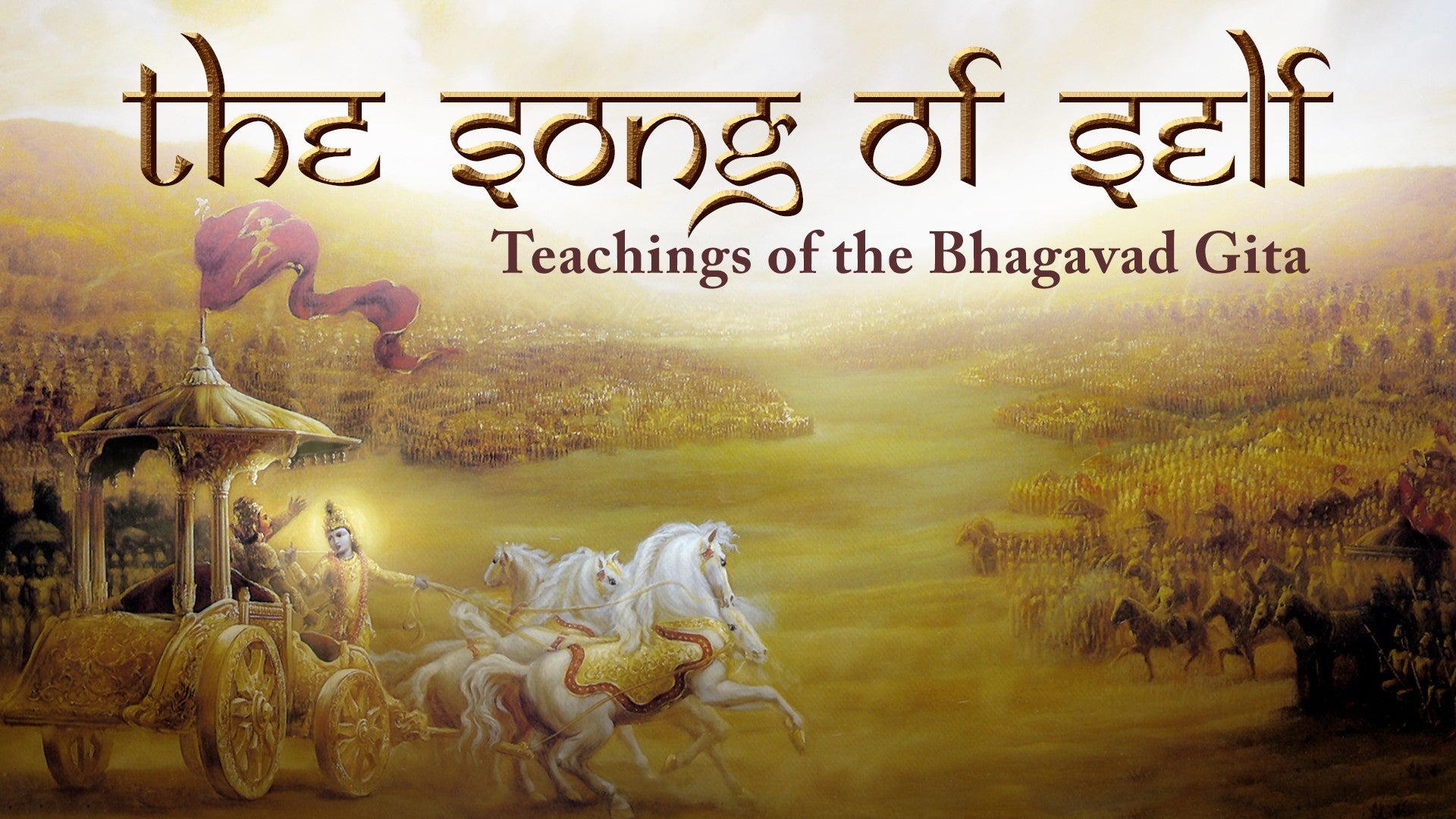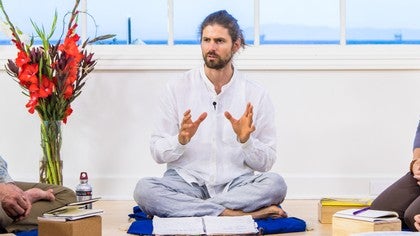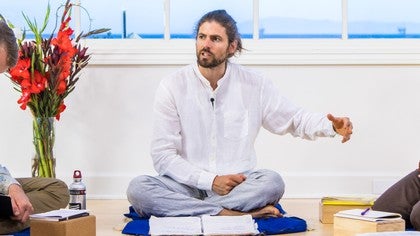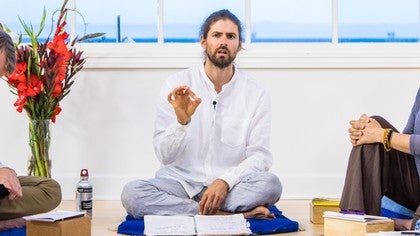Description
About This Video
Transcript
Read Full Transcript
So here in the 64th verse, having just described what can all too easily happen, if we're not so attentive and if we let old habits start to cycle and we lose ourselves in the fog of anger, our anxiety when our desires are not met, Krishna now in the 64th gives us a very encouraging teaching. And he uses contrast again, he says, Raghadvesha vayuktaysto vishaya indriyascharan atma vashayvide atma prasadam adi gacchati prasadam adi gacchati, that person attains prasadam, a sweet, clear, tranquil, serene state. So what type of person attains this serenity? He's just described someone who was lost, but another type of person can find this prasad, this blessed, tranquil, integrated calm state. So what type of person is this? He says, Raghadvesha vayuktaysto vishaya indriyascharan adna vashayvide atma. And this verse I find so beautiful because Krishna's basically saying that the wise, established one, remember Arjuna's question, how is the wise, established one? Krishna says, that person moves freely among the objects of the senses but is not perturbed. So he says, Raghadvesha vayuktayi. So having disconnected from the troubling power of Raghadvesha, so no longer bound by the influence of those colouring desires, those tinting, veiling desires, to want this, to want to avoid that, having gone beyond that, adna vashayi, by his or her own sweet will, not by a forced imposition but by the natural willfulness that arises by exposing the system to the sweetness of integration. So adna vashayi means by one's own will. But it could be easy to misinterpret this as having to say, I must be very willful and very resolute not to let myself fall under the sway of Raghadvesha. But the idea doesn't really work like that. We don't fight against those troubling influences. Instead what we actually do is invite the harmonising influence. We invite the system to experience the fullness that comes when all the different powers work as one and then naturally the potentially troubling influence of running after this short-term pleasure or running away from that short-term pain, they don't trouble us in the same way at all because we're more connected to that sweetness of the integrated action. So he says, Raghadvesha is true. Adna vashayi, indriya is charan. So indriya is charan, vishayan. So vishaya is the object. So having to do with the sense objects, char, moving amongst them, moving through them, videyatma, with the atma videya, with the self, very serene, very stable, well-established, well-contented, well-controlled, prasada-marikachti, then we attain this sweet serene state. So thinking back to the story we shared earlier about that devotee who went off to the cave, this is what his master wanted him to understand. That is, only when you can move freely amidst the objects of sense and not be perturbed by them, only then do you really access prasada, that sweet state that is its own satisfaction. It automatically stops you hankering after those transient, how do you say, temporary stopgap satisfactions. So I have a personal example of how this works practically because this idea of prasada or the sweet serene space.
Some of you may be familiar with this word prasada. If you go to an Indian temple or you attend a ritual puja, a type of worship, sometimes people talk about prasada in this type of scenario as the offering, the fruits of the offerings. If they offer, for example, fruits or sweets, maybe these will be distributed amongst the people who attend the ritual. The idea is that the things that have been offered have been made into prasada, they've made into this sweet thing that is conducive to a serene experience because they've been bathing in the devotional, loving, present energy of the ritual. This is the idea. But prasada here, it doesn't mean that. It means a sweet state of deep serenity and calmness. So sometimes in practice, we actually remain somewhat negligent of the depth of sweetness and the depth of serenity that we're actually experiencing. The idea is that serenity is actually our essence. So when we unveil it, we don't notice how beautiful it is because it just feels so normal. Most people practice and they think, well, yeah, my life. They don't notice how much sweeter, how much more supported, how much more ease and flow has come into their life through the effort they've made to foster steadiness. Because when things flow, when things feel serene, it just feels kind of normal. So we don't notice it. But when you will notice it is if you're in a situation that previously would have made you freak out and you walk through it calmly. And sometimes you might not even notice it, but your friend or your family might. And this is one of the beautiful ways that being in family and in community and in society serves as the mirror for our practice, that conservator shows how the practice is really working. Sometimes often people say, you think you're getting somewhere. Go and live with your parents for a couple of weeks. Go and spend some time with your school friends who used to think of you like that. And then you'll find out, am I really rid of that old pattern that they used to see me through the lens up? But coming back to the example, a few years ago I used to live in Thailand and I used to teach a yoga studio there. And one of the regular students found that yoga had been such a positive influence in her life. And this lady had had a bit of a drink problem. She was fond of drinking alcohol and realized that it wasn't doing her much good. She didn't particularly consciously start yoga because she wanted to use it to overcome that, but she found that once she started doing the yoga practice, suddenly, easily, she stopped drinking or just didn't feel the need. And she'd be out with friends and her friends would be drinking rather a lot. And she'd just, no, no, actually tonight I just have a fruit juice or what they call a mocktail, like a cocktail made of without any alcohol. And she just realized that she wasn't missing it. And it was her husband who pointed out to her. Now, this lady had a friend who, for want of a better word, was a chocoholic. Yeah?
She loved chocolate, but then she realized that she wasn't actually loving it anymore. She was just stuffing her face full of it and not really enjoying it. And chocolate had been for her in her earlier days a real treat, a real indulgence, something she really enjoyed. But she realized, I'm actually not enjoying chocolate anymore. It's got this compulsion about it. You know, she'd be going past a chocolate shop and she'll just like buy a load, go off to the toilets or something and stuff her face with it. It was really like this. But this lady saw that her friend wasn't drinking anymore. She said, hey, I noticed that, you know, you remember a couple of years ago, you were telling me that you thought you had a drink problem, but I've not seen you even have a drop for months. She's like, oh, yeah, yeah, that's true. How have you done it? Well, I don't know. I didn't really think about it actually. It's just happened. But, and her friend said, but well, I noticed it's kind of since you started going to those yoga classes, you know? And, you know, I don't know if you've noticed, but I'm not really feeling comfortable about my relationship to chocolate. I'd like to do something about it. So maybe this yoga business can help me too. And so the friend said, sure, it's really nice the place I go. The teachers are all very good. Meet me next week and I'll take you. So they do. The friend who'd been practicing for a while even makes sure she has her own mat. Very thoughtful. And then they meet. And this is in Bangkok, this happened. And in Bangkok, one of the means of transport people used to get around is the SkyTrain. And the yoga studio was very close to a SkyTrain stop. And one way you can access the yoga studio is to get off the SkyTrain and walk through this very big and rather luxurious department store and go out the back exit, having passed through the food hall. The food hall, which is fabled for having in its stocks a cornucopia of world food delights, including, guess what, handmade artisanal chocolate. And there's actually a chocolate in the supermarket. It's got this whole section. As you walk past it, guess what you smell? Amazing chocolate being made. So the two ladies are walking towards the class and the newcomer is feeling, yeah, great. I'm really ready to do something about this chocolate issue. And they walk through the department store, pass the chocolate shop. And the one's like, what are you doing? You know, it's supposed to be helping me come away from this. And she's like, I don't feel I want to go to the class. I feel like I want to buy chocolate now. But a friend goes, no, no, no, come on, come on, come on. And they go to the class. And then the friend, okay, next week we'll go in a different way. You don't need to come through here. There's another way to go. And so always then they make it their habit to enter the studio from a different way. They still travel by sky, but rather than take the direct route, they walk down to the street and around the department store and into the yoga studio. Anyway, months go by. And then one day after class, there are some other friends of theirs visiting. And then afterwards they have the idea to go and get some food inside the same department store because it has several places you can eat. And they walk past the chocolate place. And nobody, no, no, they let the first lady notices that her friend doesn't even bat an eyelid. So the next week, when they just the two of them together, after the class, she also walks through, wow, okay, I'm going to test it.
And the next time on the way, they say, oh, let's just go the quick way today. She actually arranges to be slightly late. So they have to take the fastest way and they walk through the department store. Her friend, and then after the class, they walk back to the department store. And the first friend says to the second, he says, have you noticed? Notice what? Well, it's working, isn't it? What do you mean? Well, have you noticed that the last few times you've come, you've walked straight past the chocolate shop and you haven't been disturbed? Oh, yeah. So shall we go and have some? And now she goes and buys some chocolate and she actually really relishes it. It takes a little bit and lets it melt on her tongue. And she really enjoys it. And then she just puts the rest away and later the day or the next day she enjoys it a little bit more. And so sometimes we don't actually notice until somebody else points it out to us because this prasada, this serene state feels so like home. So the chocolate example is kind of silly, but it kind of works like this. But the more important and underlying point here, Krishna's emphasizing, you know you're truly serene when your serenity is not disturbed by the influences that would previously have robbed you of it. So whatever it is, the thing that disturbed you, if you can be exposed to it and still be genuinely serene, not pretending to be serene, but genuinely serene, then you know you've overcome it.
The Song of Self: Bhagavad Gita: Chapter 2
Comments

You need to be a subscriber to post a comment.
Please Log In or Create an Account to start your free trial.








